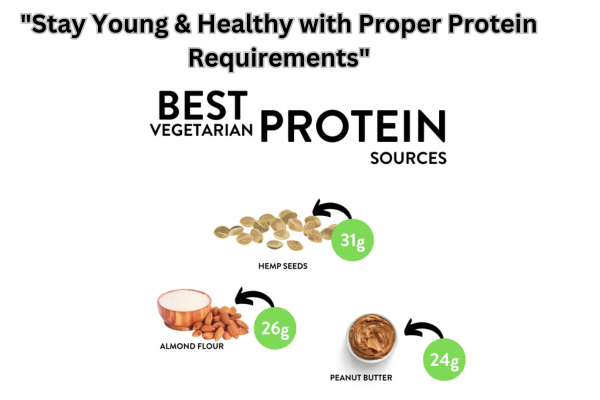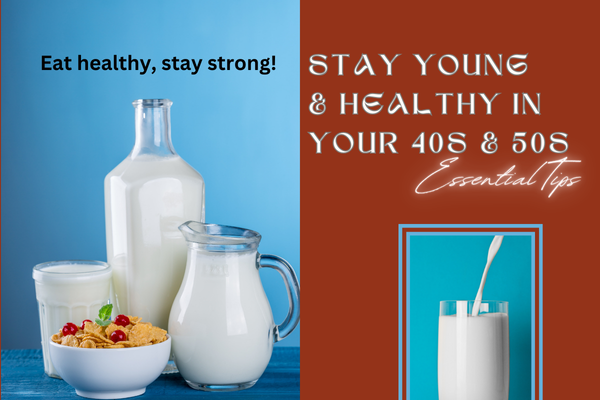Stay Young and Healthy by maintaining a balanced diet, which is essential for overall health, whether you are young or in old age. Understanding the daily requirements of macronutrients and essential vitamins helps optimize energy levels, muscle maintenance, and overall well-being. Stay Young and Healthy by following a balanced diet during early adulthood, as it can build strength and a fit physique, giving you a younger appearance in your 40s and 50s. This article will guide you through the Recommended Dietary Allowance (RDA) for an adult and provide cost-effective food sources to meet these needs. Remember, to Stay Young and Healthy, your diet is your best ally.
1.Stay Young and Healthy with Your Daily Caloric Needs
Daily calorie requirement for you depends on your age, gender, activity and built. If you are adult and moderately acting it range between 2400 to 2800kcal.If you are a female then take around 2100 to 2400 kcal. If you want to lose weight then reduce around 500 kcal from total. If you want to gain weight then add 500kcal in total.
Moderate activity includes walking for more than half hours, going upstairs and downstairs multiples, running, having active office work, daily house chores cooking, sweeping, etc
Factors Affecting Caloric Needs:
Age: Younger individuals require more calories due to higher metabolism.
Activity Level: Moderate activity includes light exercise or physical movement apart from daily routine.
Body Composition: Muscle mass affects calorie burning capacity.
Cost-Effective Calorie Sources:
Following are few calories sources every person can include in their diet in moderation:
– Rice (₹40/kg) – Rich in carbohydrates, providing a good energy source.
– Whole wheat flour (₹30/kg) – Used for chapatis, supplying fiber and energy.
– Bananas (₹50/dozen)– Natural energy boosters and easy to digest.

2.Protein Requirements
Protein is crucial for muscle repair, immunity, and enzyme production. The RDA for protein is *0.8-1.0g per kg of body weight, meaning an average adult male weighing 70 kg needs **56-70g of protein per day*.
Cost-Effective Protein Sources:
– *Eggs (₹7-8/piece)* – 6g protein per egg, rich in B vitamins.
– *Lentils (₹100/kg)* – 24g protein per 100g, budget-friendly plant protein.
– *Peanuts (₹150/kg)* – 26g protein per 100g, also rich in healthy fats.
– *Milk (₹50/litre)* – 8g protein per glass, contains calcium and casein protein.
Other sources include paneer, pulses(dal), curd, chicken, fish, tofu, soyabean etc
3. Carbohydrate Requirements
Carbohydrates provide the primary source of energy. The RDA suggests that *45-65% of daily calories* should come from carbs, translating to *300-350g per day*.
Cost-Effective Carbohydrate Sources:
– *Oats (₹150/kg)* – Complex carbs with fiber for slow digestion.
– *Potatoes (₹20/kg)* – Budget-friendly, rich in potassium and starch.
– *Brown Rice (₹80/kg)* – Whole grain with more fiber than white rice.
– *Roti (Whole Wheat Bread) (₹30/kg flour)* – Common staple with fiber and sustained energy release.
Other source include fruits, vegetables(carrot, beets, peas), yogurt etc.
4. Fat Requirements
Healthy fats support hormone production, brain function, and vitamin absorption. *20-35% of daily calories should come from fats, which equals **50-70g per day*.
Cost-Effective Sources of Good Fats:
– Groundnut oil (₹200/litre) – Rich in monounsaturated fats.
-Coconut (₹40-60/unit) – Contains healthy MCTs for quick energy.
– chia seeds, Flaxseeds, pumpkinseed – High in omega-3 fatty acids and fiber.
– *Almonds (₹800/kg, consume in small amounts)* – Good for heart health and protein intake
Other source include egg yolk, peanut butter, ghee, milk products etc.
5. Vitamins and Minerals
These play vital role in various body functions. Some essential ones include iron, calcium, zinc etc.
Important vitamins includes C,D,B12 etc.
6. Hydration and Fiber Intake
An adult male should drink *2.5-3 liters of water per day* for optimal hydration, digestion, and toxin removal.
Fiber Intake (RDA: 30-38g/day)
– Sources: Whole grains, vegetables, fruits, and nuts.
– Benefits: Prevents constipation, aids digestion, and regulates blood sugar.
Conclusion
A well-balanced diet consisting of adequate calories, protein, carbohydrates, healthy fats, vitamins, and minerals ensures a healthy and active lifestyle. Stay Young and Healthy by choosing budget-friendly and nutrient-dense foods to meet daily nutritional needs without overspending. Prioritizing whole foods, hydration, and fiber-rich sources will significantly enhance overall well-being. Beyond diet, you need a few lifestyle changes like adequate sleep, daily exercise, meditation, yoga, and quitting smoking. These habits will help you Stay Young and Healthy for years to come.
Eat healthy, stay strong!





